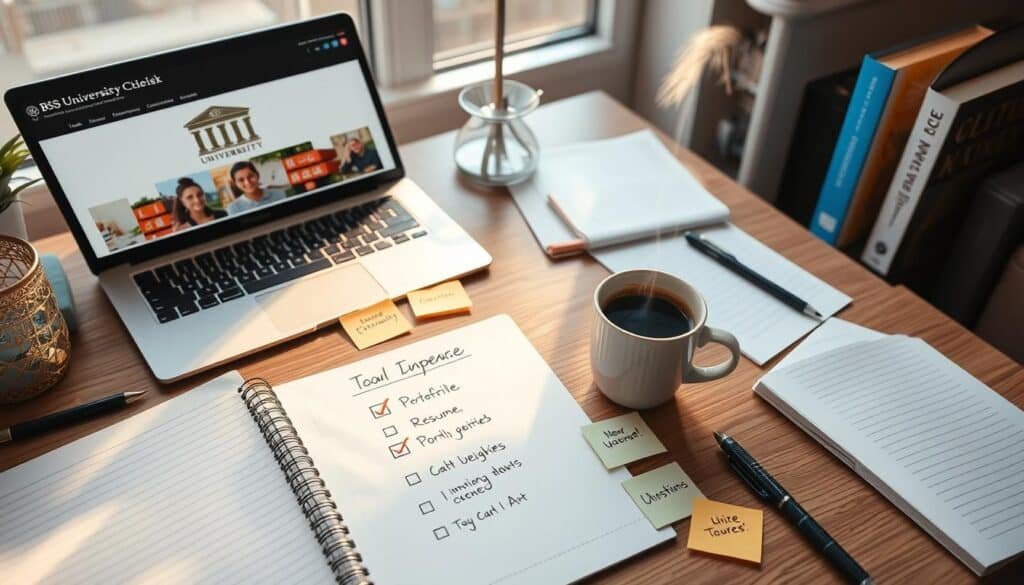How To Prepare For University Interviews are a big part of getting into college. They let you show who you are, talk about your achievements, and show you really want to be there. Even though not all colleges have interviews, being ready can really help your chances.
Also Read: What Are The Best Exam Hacks For Students To Boost Performance?
Key Takeaways
- University interviews allow students to showcase their personality and interest in the school.
- Preparation is key, including research on the college, practicing responses, and conducting mock interviews.
- Interviews can cover a range of topics, from academic fit to critical thinking skills.
- Interviews generally last between 30 minutes to an hour, with the length varying by school.
- It’s important to engage in a genuine conversation during the interview, rather than appearing overly rehearsed.
Understanding the Importance of University Interviews
University interviews are key in the college admission process. They help schools see more than just grades and personal statements. These talks give a deeper look at a candidate’s college interview importance, personality, and if they fit the university.
Also Read: How To Get Into Your Dream University?
Why Universities Conduct Interviews
Not all students will have to go through an interview. But, those applying to health or education programs, or to top schools like Oxford and Cambridge, usually do. Interviews help schools see if a student is right for their program. They look at grades, personal statements, and entrance tests too.
What Interviewers Look For
Interviewers check many things. They want to see if you know your stuff, can think critically, and are motivated. They might ask why you chose your subject and university. They also ask tough questions about your field of study.
The Role of Interviews in Admission Decisions
Interviews are important because schools get a lot of applications. They let schools evaluate candidates in a different way. Interviews can be one-on-one, group talks, or MMIs. Schools usually tell you how they’ll do it.
But, interviews are a big part of deciding who gets in, especially at top schools.
Common Interview Formats and Types
University interviews come in different styles. You might face a traditional talk with a tutor, or an Oxbridge interview with tough questions. Medical courses often use Multiple-Mini Interviews (MMI), which test various skills through different stations. Some interviews are group-based, and you might need to do tasks during the process.
The usual interview lasts about 30 minutes. Behavioral interviews look at past actions to guess future ones. The STAR technique is key for these. Sequential interviews have several steps and interviewers, while group interviews focus on one question at a time.
Technical interviews check your tech skills, common in tech jobs. Phone interviews are often the first step. But, in-person interviews are still the most common, especially at the end. Medical school interviews can vary, from one-on-ones to MMIs.
| Interview Type | Description |
|---|---|
| Conventional Interview | Discussion-based interview with a course tutor |
| Oxbridge Interview | Challenging questions to test candidates’ reactions to new situations |
| Multiple-Mini Interviews (MMI) | Series of ‘stations’ testing different traits, often used for medical courses |
| Group Interview | Each member of the group usually focuses on asking one question at a time |
| Behavioral Interview | Focuses on predicting future behavior by evaluating past behavior |
| Sequential Interview | Series of steps with several interviewers in a pre-planned sequence |
| Technical Interview | Assesses candidates’ technical abilities, common in technology companies |
| Phone Interview | Used as a first step in the hiring process by 22% of employers |
| In-person Interview | Historically the most common method, especially during the final stages |
Getting ready for interviews is crucial. Employers can tell who’s ready and who’s not. Use the STAR technique for behavioral interviews. Also, ask questions to show you’re interested in the company.
Also Read: How To Overcome Exam Anxiety?
How To Prepare For University Interviews

Getting ready for a university interview is key to making a good impression. Start by researching the university and the specific academic program you applied to. Learn about the curriculum, faculty, and job opportunities. This shows you’re really interested and a good fit.
Then, review your application materials like your personal statement and transcripts. This helps you talk about your skills, experiences, and why you want this degree. It’s important to be clear and confident about your qualifications.
Practice Common Interview Questions
Think about and practice answering common interview questions. Questions like “Why do you want to study this subject?” and “Why did you choose this university?” Do mock interviews with friends or teachers to get better. It boosts your confidence and helps you improve your answers.
The interview is your chance to show off your strengths and personality. By preparing well for the university interview, you’ll feel more confident. You’ll also make a strong impression on the admissions team.
“Preparation is the key to success in any interview. The more you practice, the more comfortable and confident you’ll feel during the real thing.”
Professional Presentation and Etiquette

Getting ready for a university interview is more than just practicing your answers. Looking professional and showing good manners can really make you stand out. From what you wear to how you act, every little thing counts.
Also Read: How Are University Admission Requirements Simplified For Students?
Wear something smart and comfy, aiming for a office smart/casual vibe. Steer clear of anything too casual or too flashy. A good suit, a nice shirt, and a tie (for guys) or a nice blouse and pants or a skirt (for girls) are usually fine. Also, keep your posture straight, make eye contact, and shake hands firmly when you meet your interviewer.
Get to your interview at least 10 minutes early to get to know the place and calm down. For online interviews, make sure your tech is ready and your internet is strong. Be kind, polite, and listen well to what they ask you.
- Arrive 10 minutes early for on-campus interviews
- Dress professionally in office smart/casual attire
- Maintain good posture and make eye contact
- Offer a firm handshake when greeting the interviewer
- Be polite, respectful, and attentive throughout the interview
By paying attention to how you look and act, you can leave a good impression at your university interview. This can help you get into the program you want.
Essential Interview Day Tips

As the interview day gets closer, having a good plan is key. It’s important to prepare well before and after the interview. Each step is crucial for your success.
Also Read: What Are The Best Exam Success Tips For Students?
Before the Interview Checklist
- Arrive 10-15 minutes early to the interview location. Being on time shows you’re reliable and professional.
- Bring multiple copies of your resume, transcripts, and any relevant portfolio materials. It shows you’re well-prepared.
- Review your research on the university, program, and position. Having thoughtful questions ready shows your interest.
During the Interview Strategies
During the interview, keep eye contact and speak clearly. Be yourself and avoid rehearsed answers. Use the STAR method for behavioral questions to give clear answers.
Post-Interview Follow-up
After the interview, think about what went well and what didn’t. Send a thank-you note within 24 hours. It shows you’re still interested and can make a good impression.
Follow these tips to increase your chances of success. With good preparation and a professional attitude, you can show your strengths and fit for the program.
Also Read: Campus Life At The University Of Toronto
Conclusion
University interviews are a great chance to stand out in college admissions. By preparing well, dressing professionally, and being yourself, you can boost your chances. It’s also a time to see if the university fits your goals.
Go into the interview feeling confident. You’ve been invited because you have something special to offer. The tips in this article can help you show your best self to the admissions team.
A good university interview can change your college journey. Be yourself, show your unique qualities, and prepare well. This way, you can stand out and reach your academic dreams.
FAQs
Q: What is the purpose of the admissions interview in university applications?
A: The admissions interview is part of the college admissions process where admissions officers assess an applicant’s fit for the university. It allows applicants to showcase their personality, passion, and suitability for the course they want to study.
Q: What are some common university interview questions I may be asked?
A: Common college interview questions include inquiries about your personal statement, motivations for choosing the university, and your interests in the course modules. You may also be asked about your academic achievements and extracurricular activities.
Q: How can I prepare for a college admissions interview?
A: To prepare for a college admissions interview, it is essential to re-read your personal statement and familiarize yourself with the course information. Practice your responses to common university interview questions and think about your answers to possible questions you might be asked.
Q: What type of interview can I expect during the admissions process?
A: The type of interview can vary; it may be a one-on-one interview, a group interview, or even a video interview. Understanding the format will help you prepare accordingly and put your best foot forward.
Q: How should I dress for my university admission interview?
A: It’s important to dress appropriately for your college admissions interview. Business casual attire is generally recommended, as it shows respect for the interview process and creates a positive impression.
Q: What should I do if I feel nervous before the interview?
A: Feeling nervous is normal, but interview tips such as deep breathing exercises, practicing your responses, and visualizing a successful interview can help calm your nerves. Remember that admissions officers are looking to get to know you, not to intimidate you.
Q: Are testimonials from alumni helpful during the interview process?
A: Yes, testimonials from alumni can provide valuable insights into the university experience, and they may help you articulate your reasons for wanting to study at that institution during your interview.
Q: How can I show my passion for the subject during the interview?
A: You can demonstrate your passion for the subject by discussing relevant experiences, projects, or readings that have influenced your academic journey. Be prepared to share specific examples that showcase your enthusiasm.
Q: How important are interview tips for gaining admission to top universities?
A: Interview tips are crucial for gaining admission to top universities, as they can help you navigate the interview process effectively. A well-prepared applicant is more likely to impress admissions tutors and increase their chances of receiving an offer.
Q: Should I ask questions during the university admissions interview?
A: Yes, asking questions during your interview shows your interest in the university and helps you gather important information. Prepare a few thoughtful questions about the course or university life to engage with the admissions officers.
Source Links
- https://bigfuture.collegeboard.org/plan-for-college/apply-to-college/application-process/college-interviews-practice-questions-and-strategies
- https://www.theuniguide.co.uk/advice/ucas-application/university-interviews-how-to-prepare
- https://www.betterunichoices.com/articles/university-admissions-interviews
- https://www.brusasports.com/2024/03/14/university-interviews-and-how-to-prepare-for-them/
- https://career.vt.edu/job-search/presenting_yourself/interviewing/types-locations/typical-format.html
- https://careercenter.tamu.edu/former-students/step-by-step-guide/interview-preparation/interview-types
- https://careercenter.umich.edu/content/interviewing-resources
- https://www.princetonreview.com/college-advice/college-interview-tips
- https://www.ucas.com/applying/after-you-apply/undergraduate-interview-invitations
- https://www.timeshighereducation.com/student/advice/how-prepare-online-university-interview
- https://www.umf.maine.edu/careers/interviewing/interview-dos-and-donts/
- https://career.vt.edu/job-search/presenting_yourself/interviewing/do-dont.html
- https://www.higheredjobs.com/articles/articleDisplay.cfm?ID=2
- https://ung.edu/career-services/online-career-resources/interview-well/tips-for-a-successful-interview.php
- https://www.colorado.edu/career/2024/03/07/6-ways-prepare-interviews
- https://www.careereducation.columbia.edu/resources/things-do-during-and-after-your-interview
- https://www.asuprepdigital.org/blog/college-interview-questions/
- https://www.foundationlearninggroup.com/blog/how-to-prepare-for-a-college-interview





